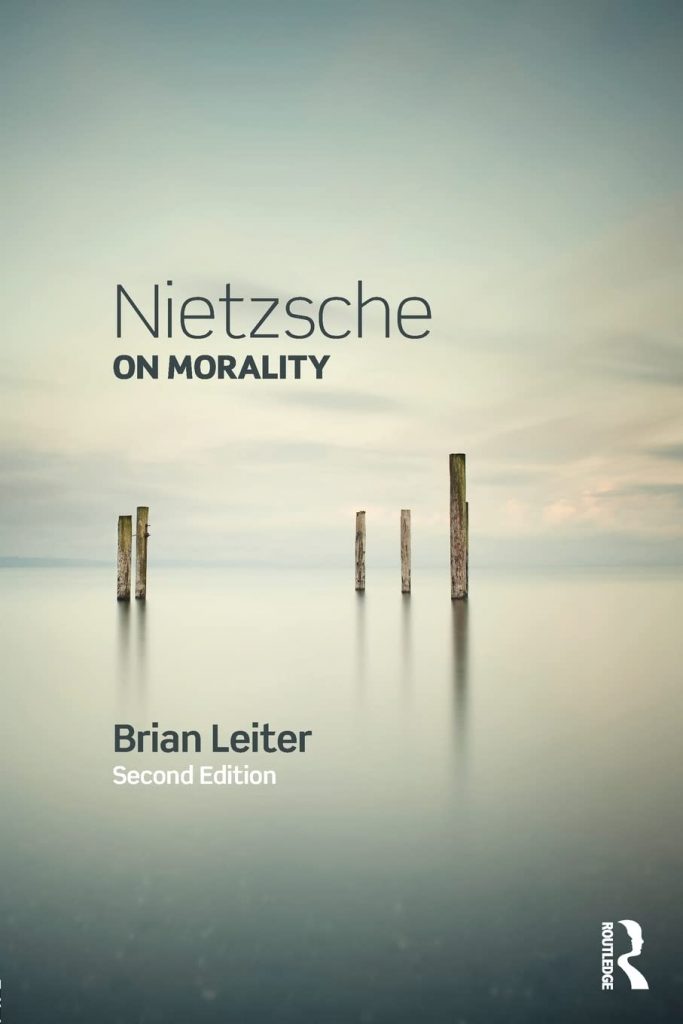In our quest to understand the intricacies of philosophical thought, we stumbled upon “Nietzsche on Morality” by Brian Leiter. This second edition dives deep into the provocative ideas of one of history’s most renowned philosophers.
The essence of Nietzsche’s critique of Christianity and his relationship with Schopenhauer is captured enticingly through Leiter’s analysis. We found the biography section particularly enlightening, clarifying the often-misunderstood timeline of Nietzsche’s popularity.
We appreciate Leiter’s unshrouded take on Nietzsche’s teachings—he approaches complex moral questions without excusing or diluting the philosopher’s stances. Yet, some might find the connection between Nietzsche’s time and our current era a bit tenuous in the latter chapters. The text is accessible, although newcomers to Nietzsche should prepare for an academic tone and advanced lexicon.
Bottom Line
For those interested in a comprehensive study of Nietzsche’s moral philosophy, “Nietzsche on Morality” comes highly recommended.
It provides a clear perspective on Nietzsche’s work and offers a depth of analysis that’s both enlightening and intellectually stimulating.
Curious minds should not hesitate – Click here to explore “Nietzsche on Morality” on Amazon and delve into the mind of Nietzsche.
Overview: Nietzsche on Morality
In our exploration of “Nietzsche on Morality,” we encountered an insightful exposition by Brian Leiter. His work digs deep into Nietzsche’s criticism of acclaimed philosophers such as Schopenhauer as well as Christianity. While the book initially depicts Nietzsche’s limited early popularity, it evolves into a rigorous examination of his moral philosophy.
From our perspective, Leiter’s approach in discussing Nietzsche is both comprehensive and unflinching. Unlike other secondary sources that either sanitize or dilute Nietzsche’s ideas, Leiter’s portrayal is candid, presenting both the strengths and weaknesses of Nietzsche’s moral vision.
Navigating through the text, we appreciated the depth of analysis, although it’s worth noting that some may find the use of acronyms and intense scholarly language a barrier. Still, for those willing to engage deeply with the content, the rewards are substantial.
However, the connection between Nietzsche’s ideas and modern-day implications could be more robust. Some readers found that the discussions didn’t extend to contemporary contexts effectively, which might leave one wanting a more present-day relevance.
Overall, Leiter’s book stands as a compelling and detailed examination of Nietzsche’s work, striking us as an essential reference for serious students of philosophy. Despite a few critiques about its accessibility and present-day application, our engagement with the text was enriching and thought-provoking.
Unique Insights into Nietzsche’s Philosophy
Venturing through “Nietzsche on Morality,” we are met with a vigorous and discerning exploration of one of philosophy’s most influential figures. Brian Leiter meticulously cuts through the layers of Nietzsche’s critique of Christianity and morality, a task both illuminating and challenging.
We find the text thought-provoking, especially when it explores Nietzsche’s position as a Schopenhauer critic. Leiter’s work bestows upon us a comprehensive biography that contextualizes Nietzsche’s philosophical evolution, highlighting the poignant delay of his recognition until his later, hospitalized years.
However, not all journeys through Nietzsche’s complexities are without their obstacles. The text’s use of acronyms at times asks of us a level of patience, as we must pause to untangle their meanings. Yet, the effort is rewarding, as it grants us deeper clarity into Nietzsche’s moral philosophy.
While some may find Leiter’s approach lacking a modern-day application, leading to a sense of detachment from contemporary relevance, this does not significantly detract from the potency of the analysis for us as a dedicated readership looking to grasp Nietzsche’s legacy on morality.
Indeed, Leiter’s “warts and all” approach to Nietzsche sets it apart. It neither shies away from his philosophical blemishes nor glorifies them unduly. This balance provides us with an authentic interpretive lens, something that we find other secondary literature on Nietzsche either exaggerates or oversimplifies.
In sum, our exploration through this scholarly work leaves us feeling confident in understanding the intricate moral philosophy Nietzsche left behind, signifying Leiter’s contribution as both critical and indispensable for those of us eager to delve into Nietzschean ethics.
Critical Analysis of Schopenhauer’s Influence
Having engaged thoroughly with “Nietzsche on Morality,” we’ve observed its poignant critique of Schopenhauer’s philosophy. Leiter provides an adept overview of Nietzsche’s rise to philosophical prominence, challenging the shadow Schopenhauer cast on his work. While Nietzsche’s scathing analysis of Christianity gains ample attention, his counter-arguments to Schopenhauer’s pessimism are equally commanding.
We should note, however, that some readers anticipate a stronger connection between Nietzsche’s historical context and the modern era, which is less pronounced here. Regardless, the general consensus among us is that Leiter dissects Nietzsche’s complex thoughts with a skillful hand. Eschewing the hyperbole often found in philosophical texts, his warts-and-all approach to Nietzsche’s morality is both commendable and accessible.
Admittedly, the book’s use of acronyms may initially seem daunting, but once accustomed, they serve as helpful navigational tools throughout the in-depth exploration. Whether you’re well-acquainted with Nietzsche’s oeuvre or delving in for the first time, Leiter’s robust analysis is sure to refine and deepen your understanding of Nietzsche’s enduring influence.
Educational Value and Lexile Measure
As avid readers and evaluators of philosophical literature, we find that “Nietzsche on Morality” serves as a thought-provoking text that both challenges and enriches the intellectual mind. With a Lexile measure of 1360L, the book is suitable for advanced readers who have a strong grip on complex ideas and abstract thought.
We discovered that its depth in examining Nietzsche’s critique of morality offers a stimulating educational experience for those in higher academia or with a keen interest in philosophy. The language, while complex, pushes readers to expand their vocabulary and comprehension skills.
However, it’s important to note that due to the high Lexile level, it may not be easily accessible to all readers, especially those unfamiliar with Nietzsche’s work or those who are new to philosophical studies. Beginners may find it challenging to penetrate the dense ideas presented by the author, Brian Leiter.
Overall, while “Nietzsche on Morality” presents an opportunity for substantial learning and cognitive development, it’s best approached with some prior knowledge and readiness for intensive intellectual engagement.
Key Features
Our recent experience with “Nietzsche on Morality” reveals an in-depth exploration of Nietzsche’s critiques, particularly against Schopenhauer and Christianity. This 302-page work offers a coherent biography, emphasizing Nietzsche’s posthumous rise to fame.
The paper quality and binding give a sturdy feel, which suggests it can endure multiple readings, a plus for any intensive study. At 16 ounces, it’s weighty enough to feel substantial but not burdensome for a book of its density.
Navigating the text, we find the author, Brian Leiter, presents a ‘warts and all’ view. Leiter’s deep dive sans glorification distinguishes the book from others that tend to gloss over the more controversial aspects of Nietzsche’s moral philosophy.
Some readers might be put off by the use of acronyms and dense scholarly language. However, for those willing to engage, there’s an undeniable richness to the content; the Lexile measure of 1360L confirms this isn’t light reading.
Approaching the later chapters, there’s a noticeable shift. The depth remains, but some may feel a disconnect with contemporary relevance, an aspect that could have bridged Nietzsche’s ideas to current discourse.
Overall, Routledge’s second edition of this philosophical examination delivers content that’s as rigorous as it is robust, truly deserving of its space on the shelf of Nietzsche enthusiasts.
Pros and Cons
Having spent some time with “Nietzsche on Morality,” we appreciate its in-depth analysis and the author’s critical approach to Nietzsche’s work. The discussion of Nietzsche’s critique of Christianity and his relationship with Schopenhauer is thorough. Furthermore, the biography details provided enrich our understanding of Nietzsche’s life and his rise to recognition post-hospitalization.
On the plus side, readers will find Leiter’s interpretation both compelling and scholarly, especially those who have read Nietzsche’s works and seek comprehensive secondary literature. His “warts and all” perspective provides a refreshing contrast to more apologetic viewpoints, positioning the book as a must-have for serious philosophy enthusiasts.
However, some readers may find the extensive use of acronyms and jargon challenging, which could slightly hinder the reading experience. Additionally, the link between Nietzsche’s morality and contemporary times is not fully developed in the final chapters, which might leave those looking for modern-day application a bit wanting.
Despite a couple of drawbacks, our take is that the book’s merits far outweigh its minor shortcomings. It’s certainly not a light read—expect a robust and demanding dive into Nietzsche’s moral philosophy. But for those with a vested interest in the subject, it’s a deeply enriching experience.
Customer Reviews
Recently, we spent some quality time with “Nietzsche on Morality” and scoured the plethora of feedback from fellow readers on Amazon. With an impressive average rating of 4.5 stars from 21 total ratings, it’s clear that this book offers valuable insights into Nietzsche’s critical perspective on morality.
Many have found the detailed exploration of Nietzsche’s critique of Christianity and biography particularly enlightening. Readers also commend the book for providing a nuanced understanding of Nietzsche’s teachings, noting that the author, Brian Leiter, doesn’t shy away from portraying the complexities of Nietzsche’s philosophy.
On the other hand, a handful of readers mentioned that while the book is scholarly and compelling, it may not always connect Nietzsche’s ideas to contemporary issues as effectively as desired. Some also found the use of acronyms a bit challenging to navigate but agreed that persisting through these minor obstacles was worthwhile.
A small contingent of readers expressed disappointment, feeling that the work didn’t meet their expectations for comprehensively covering Nietzsche. Despite this, the consensus suggests that “Nietzsche on Morality” stands out in its field and is well-respected among those seeking a thorough analysis of Nietzsche’s works.
In our view, the book strikes a strong balance, providing a deep dive into philosophical analysis while remaining accessible to those new to Nietzsche’s world. As someone eager to deepen their understanding of philosophical morality, this book has been an engaging and informative part of our journey.
Conclusion
After thoroughly engaging with this insightful text, we found that the exploration of Nietzsche’s views on morality is both comprehensive and critical. The analysis provided digs deep into Nietzsche’s critique of Schopenhauer and Christianity. Our experience with the book echoes the sense that it is a strong addition to Nietzschean scholarship, presenting a balanced ‘warts and all’ view that does not shy away from the complexities of Nietzsche’s thought.
By synthesizing biographical context and philosophical inquiry, the author offers clarity to Nietzsche’s often misunderstood positions. Although the text does challenge the reader with a fair share of acronyms and dense language, the effort put into understanding these elements is well rewarded with a richer grasp on the subject.
However, it’s not without its shortcomings. Some of us felt that the connection to contemporary relevance wanes towards the end. Nevertheless, whether you’re a seasoned reader of Nietzsche or newly acquainted with his work, this volume stands out for its rigorous analysis and scholarly approach. Despite a minority of dissents on its overall value, the consensus among us is positive, reflective of the 4.5-star rating it holds.



